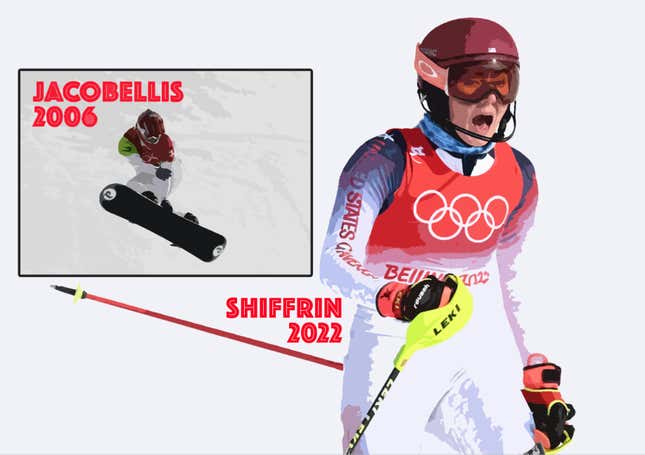
When Mikaela Shiffrin skied out of her second event at the Winter Olympics on Tuesday night, it was shocking. She’s been the face of U.S. Olympic coverage, including my coverage, and not only did she fail to medal in her first two races, she failed to even finish a run.
What made it worse was how utterly devastated she was. Our Sam Fels wrote about how the cameras lingered on her, NBC’s hosts dwelled on her, and the network got its story — for better, or in this case, for worse. I can’t think of a time I audibly urged someone on TV, who’s not a fictional character dying, to get up, but I did while watching Shiffrin.
It was one of the most devastating Olympic moments I can remember. During one of the commercial breaks between the seemingly endless footage of Shiffrin sitting next to the fence along the course was a promo of Shiffrin herself, talking about how sometimes we all need a little help getting back up. The anecdote she shared was when she was a little girl and got buried face first in the snow while skiing. When her dad lifted her out of the hole by her legs, she was cold, crying and upset, but, as good dads do, he cheered her up.
It was a particularly cruel ad placement because there was Mikaela again, alone on the snow, looking for anyone to pick her up, but the person she cited for previously digging her out of the snow, the person who was so influential in her career, the person she can’t “miss more” — her father — couldn’t help her this time because he tragically died a few years ago. The NBC producer who thought of filling time between shots of a crying Shiffrin with a promo of her sharing that story is either sadistic or incompetent.
After the race, she openly admitted to questioning everything she’s learned about alpine skiing over the past 15 years. It was less of an interview than it was an individual making a statement after a traumatic experience. The image of her sitting in her white ski gear, maroon helmet firmly pointed toward the ground will follow her forever.
A similar image stuck with Lindsey Jacobellis, the snowboard cross athlete who fell after she did a little grab over the penultimate hit of the course at the 2006 Winter Olympics. That error cost her a gold medal, and more than a decade and a half of anguish.
Longtime U.S. snowboard cross coach Peter Foley told the New York Times in 2018 that the incident stuck with her.
“She’s had a bad experience with the Olympics, and in a lot of ways she dreads the Olympics now,” Foley said. “It would be nice if she could feel better about it.”
Well, she finally can. Sixteen years and three Winter Olympics after that crash cost her a gold in the Torino Games, Jacobellis stood atop the podium in Beijing on Wednesday.
If Shiffrin ever needed a tale of redemption to help her pursue her own, Jacobellis knows all too well about overcoming a massively publicized failure on the world stage. I don’t know if China is allowing the athletes to mingle at the Olympic Village, but someone should connect those two like Steve Rogers and Sam Wilson in Captain America: Winter Soldier.
If not, maybe just email Shiffrin the quotes from Jacobellis’ post-win presser.
“They can keep talking about (the fall) all they want because it really shaped me into the individual that I am and kept me hungry, and really helped me keep fighting in the sport,” Jacobellis said.
Cliches about “What doesn’t kill you makes you stronger” ring hollow when they’re written by sports writers trying to motivate an athlete who will never read what they’ve written. They’re different coming from someone who’s been through it before.
The tremendous pressure felt by Olympic athletes has been well-documented, and when you combine that with this being the first real letdown of Shiffrin’s career and everything else she’s been through since PyeongChang, the potential to let these Games consume her is real.
If she’s going to let this experience hang around her neck like a medal made of lead, she should use it as Jacobellis did: Motivation to continue her pursuit of not only future Olympic glory but also career accomplishments. Jacobellis has a record six FIS Snowboard World Championships, the most of any snowboard cross athlete male or female. She also has 10 X Games gold medals.
If anyone knows that the Games don’t define you and that you can be the GOAT of your sport despite an Olympic failure, it’s Jacobellis.
Shiffrin is only 26 and already has Olympic gold medals. She has more races at this Olympics, during this World Cup season, and at the next Olympics. The story of her career is not even close to being written.
But first, Mikaela, I have someone I’d like you to meet because sometimes we all need a little help getting back up.